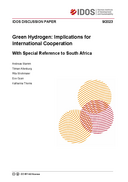
Green hydrogen: implications for international cooperation: with special reference to South Africa
Stamm, Andreas / Tilman Altenburg / Rita Strohmaier / Ece Oyan / Katharina Thoms (2023)
Discussion Paper 9/2023
We explore the potential economic co-benefits of green hydrogen for exporting countries in the Global South and recommend policies for governments and international cooperation to enhance local value creation, employment and other forms of benefit-sharing. A case study on South Africa is included.